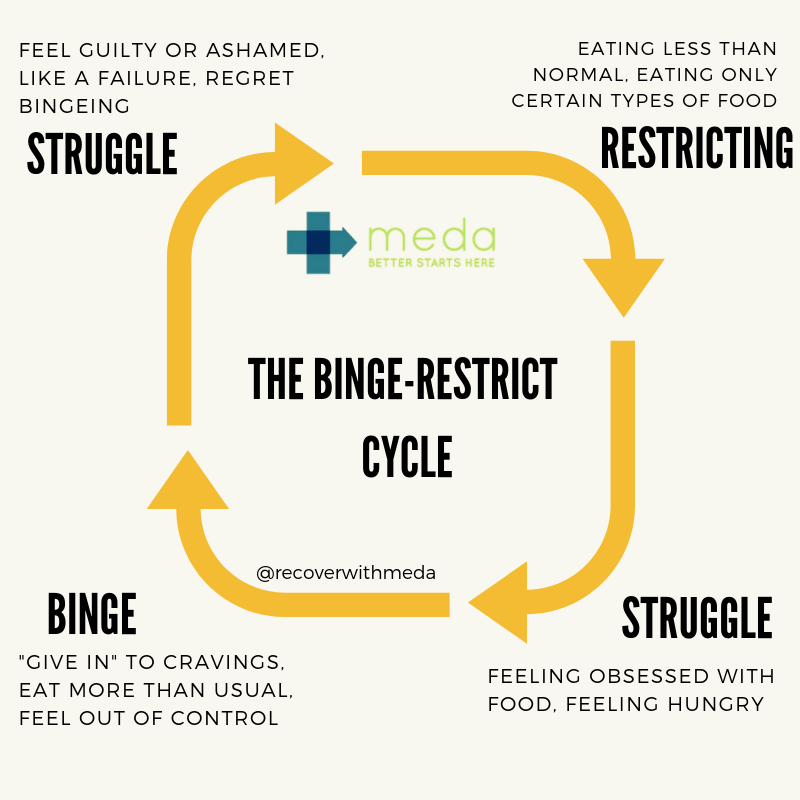
Is it Binge Eating Disorder (BED) or are you stuck in a vicious cycle?
Is it Binge Eating Disorder (BED) or are you stuck in a vicious cycle?
Written by Graduate Clinical Intern and Clinical Support Specialist, Meagan Mullen
Binge eating disorder is an eating disorder characterized by episodes of uncontrollable eating, typically not followed by compensatory behaviors. People often get confused and believe that if they are engaging in a binge, they automatically meet criteria for a BED diagnosis, but that’s not always the case!
Let’s break it down by taking a look at Binge Eating Disorder, Bulimia Nervosa, and the binge-restrict cycle.
 As previously stated, BED is characterized by episodes of binge eating that are usually not followed by compensatory behaviors such as vomiting, laxative abuse, fasting, or excessive exercise. Bulimia Nervosa, however, differs from BED in the sense that people with this disorder do engage in these modes of compensation. People often believe that Bulimia Nervosa strictly refers to self-induced vomiting after eating, but purging can refer to many different kinds of unhealthy compensation.
As previously stated, BED is characterized by episodes of binge eating that are usually not followed by compensatory behaviors such as vomiting, laxative abuse, fasting, or excessive exercise. Bulimia Nervosa, however, differs from BED in the sense that people with this disorder do engage in these modes of compensation. People often believe that Bulimia Nervosa strictly refers to self-induced vomiting after eating, but purging can refer to many different kinds of unhealthy compensation.
Despite the fact that these two diagnoses exist, many people engage in binge eating but do not meet criteria for BED or Bulimia. Instead, they find themselves stuck in a cycle of bingeing and restricting, often unsure of how to stop the cycle and get the help they deserve.
People can find themselves in this cycle for a variety of reasons, but let’s take a look at two of the most common ways people get stuck in this pattern.
Many people begin a diet in hopes of controlling their weight or shape, but after time, they’re physically and psychologically depleted. Dieting can lead to obsessive thoughts about food and feelings of extreme hunger. When people experience extreme hunger paired with an increase in thoughts about food and eating, they’re more likely to binge. Dieting (which is a form of restricting), often denies the body of necessary nutrients. This will lead to hunger that sometimes results in bingeing.
After a binge, however, people are overwhelmed by feelings of shame. They often believe that they lack the willpower to “successfully” diet. They’re shamed by the media and by diet culture and ultimately recommit to a restricting their intake. And as we know, restriction leads to physical and psychological depletion, which can ultimately lead to a binge. Thus creating the cycle of bingeing and restricting.
An alternative way that people find themselves stuck in this cycle is when the binge eating occurs first. If someone is struggling with binge-eating and is using food as a way to cope with uncomfortable emotions, they might result to restricting their intake due to the shame they feel about engaging in these behaviors. Oftentimes, people will restrict the day after a binge, eating small amounts of food at breakfast and lunch, or throughout the day entirely.
However, after making it through most of the day on an insufficient amount of food, people experience hunger at the end of the day. The combination of a lack of food and exhaustion can also lead to another binge. This evening binge can lead to more feelings of shame, therein restarting the cycle.
This pattern of bingeing and restricting can lead to health problems, such as cardiac issues, metabolic issues, and various emotional and mood disturbances. While someone engaging in this cycle might not be diagnosed with BED or bulimia, they may be given a diagnosis of OSFED or Unspecified Feeding or Eating Disorder. Both of these diagnoses are serious and deserve proper treatment and attention.
If you or someone you know is engaging in this cyclical pattern of eating, recovery is possible. Many people who struggle with eating disorders or disordered eating receive the help they need through therapy, nutrition therapy, and other group and individual supports.
If you or someone you know is struggling with an eating disorder, or if you feel like you might be stuck in the binge-restrict cycle, MEDA is here to help, and fully recovery is possible!





